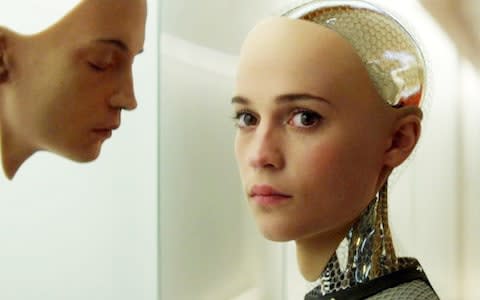The sex robots are coming: meet the campaigner who wants to stop them

Kathleen Richardson, leader of the Campaign Against Sex Robots, is worried about the future of human-robot relations. Why?
Imagine a non-sentient robot slave: one that lives in your house, does all your cooking, cleaning, and laundry, and is at your beck and call 24 hours a day.
Not only does this hypothetical robot slave – let’s call it Stuart – perform all your domestic chores: it also helps make you money. You can rent Stuart out as manual labour, or, if you own your own business, set it to work for you. It addresses you as “Master” or “Madam” and, if you’ve had a bad day, helpfully doubles up as a stress ball/punch bag that you can kick, hit and whip to your heart’s content.
Oh, and one last thing? Stuart is built to perfectly resemble an 18th-century human slave, complete with shackled feet and a brand.
If that last line gave you a bit of a jolt, it’s because you probably think that real slavery – child slavery; any form of human slavery – is an abomination. While forced labour still exists in many parts of the world today, the general consensus is that turning a human being into a piece of property is wrong.

Anything that evokes the horrors of slavery, even on a purely visual level, consequently feels wrong too. We’re not usually troubled, in an ethical sense, by our toasters. But the thought of an android toaster deliberately built to resemble a cowering human slave is enough to put anyone off their marmalade.
Revealingly, however, when it comes to the notion of sex robots – essentially animated humanoid sex slaves who never, ever say no – similar moral qualms seem to go out of the window. We might think of sexbots as a bit bizarre – creepy, even – but we don’t tend to worry too much about their effect on us, or about what they might say about our culture and values.
Dr Kathleen Richardson, a Senior Research Fellow in the Ethics of Robotics at De Montford University in Leicester who also happens to be the leader of the futuristically named Campaign Against Sex Robots, believes that it’s high time we did.
After attending a panel discussion on the Rise of Sex Robots at the Southbank Centre’s Royal Festival Hall, we caught up with Richardson to find out more about about her work.
A woman with fierce enthusiasm for her cause – her thoughts and arguments are lengthy and reasoned, touching upon everything from Aristotle's ideas about "natural" slavery to BDSM – she was both passionate and convincing.
She was also keen to stress that while she might be against exploitative sexual practices, she certainly isn't anti-sex or, indeed, anti-robot: she's been studying the latter for most of her professional life. Instead, she's worried about the ways in which our unequal society – one which punishes the vulnerable and encourages the dehumanisation of certain groups – is being reflected in the sort of robots we want to make.
It might be unfashionable these days to describe a person as being "on the side of the angels" – but we left with the impression that Richardson is definitely on the side of the good robots.
It’s not about robot rights

Let’s get one thing straight: nobody, least of all Richardson, is suggesting that we should be worrying about the tender feelings of sex robots themselves.
Movies and TV shows such as HBO’s Westworld are populated by eerie almost-humans: robots who frighten and confound us by making us question the exact difference between a mind made of silicon and the humming synapses of our own fleshy brains. But Richardson believes it’s highly unlikely that intelligent, truly sentient robots like this will exist within our lifetimes.
"There are no robots on TV or in films," she reminded us. "There are human actors playing robots."
Instead, the sort of sex robots currently in development are more like enhanced sex dolls.
Matt McMullen of the US-based Real Doll company, a sex doll manufacturer that promises to provide its customers with “the world’s finest love dolls”, is aiming to bring a rudimentary sex robot (a doll body with a speaking, fully animated head) to the market in the next few years.
Crucially, however, neither McMullen nor anyone involved in similar projects is interested in creating the sort of fictional robot played by Alicia Vikander in Ex Machina: their aim is to create a crude approximation of a person, rather than to mimic life. Outside of film and TV, we needn’t start worrying about robot rights just yet.

Some people believe in a utopian robot sex future
Dr Ian Pearson, an engineer and futurist, predicted last year that as technology improves, sex with robots will become increasingly common (and could be seen as "normal" as early as 2050). And chess master and computer expert David Levy, author of Love and Sex With Robots, has made similar predictions, suggesting in a 2009 Guardian interview that “the sex robot will happen fairly soon because the bottom is dropping out of the adult entertainment market, because there's so much sex available for nothing on the internet.”
Levy has also suggested that robots could provide a solution to loneliness, and intimacy for those unable to find human partners.
But a sexbot-heavy future might not be as benign as he and others have envisaged.
A key concern is that the unrestricted use of humanoid robots as sex toys could perpetuate rape culture, misogyny and the idea that human beings (particularly female humans involved in the sex trade) are little more than sexualised objects.

No, sex robots aren’t the same as vibrators
When this question came up during the panel discussion Richardson explained that it’s one she’s been asked so many times, she’s actually written an entire essay about it.
The crux of the matter is that vibrators and other sex aides are simply mechanical stimulation tools, rather than a intended representation of a human being. Consequently, they don't reflect our society’s commodification of female bodies. But we'd recommend clicking on the link above to get the full picture.
Advocates have compared sex robots to prostitutes
In an interview with Scientific American, Levy suggested that the sort of sex robots envisaged above would appeal to people who already pay for sex (these “punters” are predominantly male, while the majority of people working as prostitutes are female). He also explained that some of his ideas about human-robot relations were inspired by a study of the sex trade.
“I got the idea that sex with dolls is like sex with prostitutes – you know the prostitute doesn't love you and care for you, is only interested in the size of your wallet,” he wrote. “So I think robots can simulate love, but even if they can't, so what?”
He added: “I started analyzing the psychology of clients of prostitutes. One of the most common reasons people pay for sex was that people wanted variety in sex partners. And with robots, you could have a blonde robot today or a brunette or a redhead. Or people want different sexual experiences...All those reasons that people want to have sex with prostitutes could also apply to sex with robots.”
10 ways humans are still superior to robots
Levy isn’t the only person to make this analogy, and Richardson is concerned about what it reveals about our attitudes towards women working in the sex trade.
“I’ve been studying robots for more than 16 years. Not the kind of robots found in factories, but the kind of robots people are telling us going to become your friends, your lovers, your companions or your therapist,” she explained.
“So I’d been part of this narrative for over 16 years. And then there was this new narrative developing, about sex robots, and what sex robots were. And the advocates of sex robots, they said a sex robot is like a prostitute. A sex doll is like a prostitute.”
“So I began to think: that is very big statement, right? To make an analogy between a human being and a doll. So I began to look more into their arguments about how they constructed this idea that a doll, or a robot, was like a prostitute.”
Sex robots could encourage the idea that people are just ‘things’, too

The sex industry, Richardson believes, is inherently exploitative: at its heart lies the idea that human beings can be bought and sold like property, and that it’s acceptable to pay somebody who doesn’t particularly want to have sex with you to do so.
Sex, she says, isn’t just a “service”: unlike making coffee or pouring pints or writing articles it’s an intimate, bodily act, impossible to “extract” from the person providing it.
“We all recognise each other as persons, and we have rights, as persons. But if we don’t recognise each other as persons, we can start to treat and relate to each other in very different kinds of ways, and we can start to relate to each other as things,” she said. “So what these advocates of sex robots are really saying is that prostitutes are things.”
The humanoid slave robot described at the beginning of this article will most likely never be produced, because we live in a culture in which the kind of slavery it represents is generally abhorred.
Humanoid robots prepare to take over
But in a world where sex slavery and human trafficking are still major problems – and in which a man can admit to sexually assaulting women and still run for President of the United States – we should arguably start looking more critically at proposals for sex robots. Perhaps they should fill us with nagging disquiet too.
“If you didn’t have prostitution, you couldn’t have the idea of a sex robot or a sex doll,” Richardson said. “They’re an outcome of a way of reflecting on a human person as if they were a thing.”
“We live in a culture that wants to turn everything into a property: something to buy or sell or exchange. But people are different from things.”
At a glance | The furore around sex robots
For more information, visit campaignagainstsexrobots.org.